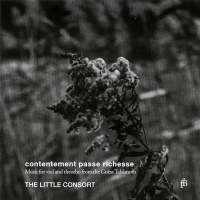Texte paru dans: / Appeared in:

Fanfare Magazine: 38:2 (11-12/2014)
Pour
s'abonner / Subscription information
Les abonnés à Fanfare Magazine ont accès aux archives du
magazine sur internet.
Subscribers to Fanfare Magazine have access to the archives of the magazine
on the net.
Fra Bernardo
FB1403111

Code-barres / Barcode: 4260307430023
The contents of this release derive entirely from a series of late 17th- and early 18th-century manuscripts acquired in the Low Countries and the Austro-Hungarian Empire. These were acquired at various times by the wealthy, ennobled Goëss clan. Musical transcription and performance were an important part of education for both sexes in many upper and middle class families of the period. It was judged an element of breeding—if you couldn’t play, you were a boor—and provided private entertainment at least marginally superior to our comparable art of the modern family that sits and watches a television together.
These manuscripts, then, were both teaching tools and elements of pleasurable pursuit. They were typically passed down through the generations and added to until interest was lost, but in this case the manuscripts appear to have been assembled in a fairly short span of time. This album’s eight suites are arranged by key, with some being successive entries in a given manuscript, and others provided out of order because they clearly weren’t meant as part of an encompassing series of movements. None reflect the so-called Classical structure of prelude, allemande, courante, sarabande, and gigue. Three “divisions” are included as well, meaning variations based in large part on diminution and augmentation over an ostinato bass.
The suites are for solo lyra viol or theorbo, with Dietrich Stöeffken looming large in the former, and Nicolas Hotman, in the latter. Stöeffken’s works are solid but relatively dull: four-square in their phrasing, with thematic material of only moderate interest. (This doesn’t apply to a two-movement suite listed as attributed to Stöeffken, and sounding nothing like him: strongly in the prevailing French style, of thematically memorable content, and possessing a lyrical melancholy that suggests whoever composed it was familiar with Marin Marais.) By contrast, Hotman’s music possesses a style and pensiveness also found in the works of Denis Gaultier, and worthy of that master. Works included here by the renowned Anonymous are also excellent, among them a passacaille for theorbo from a Suite in G Major, and a sarabande and doubles from a Suite in D Minor for lyra viol.
The performances are expert. Lyra violist Johanna Valencia and theorbist Hermann Platzer each demonstrate stylistically convincing ornamentation and provide suitably varied pacing. Both possess an attractive tone, though in the three divisions—where they both perform, with the addition of bass violist Richard Carter—Valencia’s top notes have an unpleasant, wiry sound. As it occurs nowhere else, I have to wonder whether this is a defect of the miking setup for the three musicians, which is otherwise close and spacious.
There’s much to enjoy here. With generous timings, recommended.
Cliquez l'un ou l'autre
bouton pour découvrir bien d'autres critiques de CD
Click either button for many other reviews


